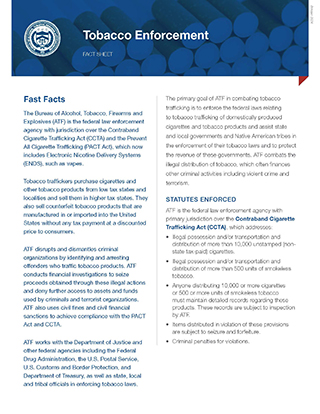

Fact Sheet - Tobacco Enforcement

Fast Facts
The Bureau of Alcohol, Tobacco, Firearms and Explosives (ATF) is the federal law enforcement agency with jurisdiction over the Contraband Cigarette Trafficking Act (CCTA) and the Prevent All Cigarette Trafficking (PACT Act), which now includes Electronic Nicotine Delivery Systems (ENDS), such as vapes.
Tobacco traffickers purchase cigarettes and other tobacco products from low tax states and localities and sell them in higher tax states. They also sell counterfeit tobacco products that are manufactured in or imported into the United States without any tax payment at a discounted price to consumers.
ATF disrupts and dismantles criminal organizations by identifying and arresting offenders who traffic tobacco products. ATF conducts financial investigations to seize proceeds obtained through these illegal actions and deny further access to assets and funds used by criminals and terrorist organizations. ATF also uses civil fines and civil financial sanctions to achieve compliance with the PACT Act and CCTA.
ATF works with the Department of Justice and other federal agencies including the Federal Drug Administration, the U.S. Postal Service, U.S. Customs and Border Protection, and Department of Treasury, as well as state, local and tribal officials in enforcing tobacco laws.
The primary goal of ATF in combating tobacco trafficking is to enforce the federal laws relating to tobacco trafficking of domestically produced cigarettes and tobacco products and assist state and local governments and Native American tribes in the enforcement of their tobacco laws and to protect the revenue of these governments. ATF combats the illegal distribution of tobacco, which often finances other criminal activities including violent crime and terrorism.
Statutes Enforced
ATF is the federal law enforcement agency with primary jurisdiction over the Contraband Cigarette Trafficking Act (CCTA), which addresses:
- Illegal possession and/or transportation and distribution of more than 10,000 unstamped (non-state tax-paid) cigarettes.
- Illegal possession and/or transportation and distribution of more than 500 units of smokeless tobacco.
- Anyone distributing 10,000 or more cigarettes or 500 or more units of smokeless tobacco must maintain detailed records regarding these products. These records are subject to inspection by ATF.
- Items distributed in violation of these provisions are subject to seizure and forfeiture.
- Criminal penalties for violations.
ATF also enforces the Prevent All Cigarette Trafficking (PACT) Act, which, among other things:
- Requires all distributors of cigarettes, which includes Electronic Nicotine Delivery Systems (ENDS) and other smokeless tobacco products, such as chewing tobacco, who sell or advertise in interstate commerce to register with and report certain information to ATF and the tax administrators of the states where shipments of tobacco are made or advertised.
- Requires tobacco sellers who ship to end-users to comply with reporting, labeling, delivery and recordkeeping requirements.
- Prohibits anyone who receives the non-compliant list from shipping cigarettes, ENDS or smokeless tobacco to a person on the non-compliant list.
- Requires remote sales to consumers to comply with all state licensing, regulatory, excise tax and cigarette stamping laws.
- Allows ATF to inspect anyone engaged in delivery sales.
- Mandates age verification and packaging provisions.
- Prescribes criminal and civil penalties for violations of these provisions.
Trafficking Patterns
Tobacco traffickers purchase cigarettes and other tobacco products from low tax states or low tax localities without paying tax or tobacco Master Settlement Agreement(link is external) (MSA) fees and sell it in higher tax states. Legal distributors pay significant taxes on their product, including $1.01 per pack in federal excise tax, $0.17 to $7.42 per pack in state and local excise taxes, and about $0.80 per pack to the MSA fund.
The financial gain of tobacco trafficking is immediately apparent. For example, purchasing legally taxed products in Virginia (a low excise tax state) for approximately $4.70 a pack and reselling them in New York City (a high excise tax city in a high excise tax state) for approximately $13.50, creates an estimated $8.80 per pack profit margin. In this example, a single carton (10 packs) yields a profit of $88, a single case (60 cartons) yields $5,280, and a single truckload (typically 800 cases) yields $4.2 million.
Cigarettes and ENDS are often sold on the internet and distributed without payment of taxes and without proper age verification, which violates federal and state laws.
Counterfeit cigarettes are imitations of legitimate brand name cigarettes, manufactured under low quality-control standards and are smuggled into the United States to avoid paying the required taxes. ENDS can also be illegally imported into the United States and/or illegally distributed in interstate commerce, which violates federal and state laws.
For more information on ATF tobacco programs, visit the Alcohol and Tobacco section of the ATF website.
###




